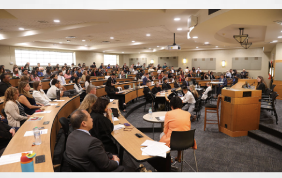In Honor of Constitution Day
Hofstra University’s Maurice A. Deane School of Law marked Constitution Day 2024 on September 16 by staging a re-enactment of Korematsu v. United States, the 1944 trial and appeal that upheld the constitutionality of interning Japanese Americans solely on the basis of race.
Constitution Day is a national celebration commemorating the formation and signing of the U.S. Constitution on September 17, 1787.
The Supreme Court’s landmark decision in Korematsu v. United States maintained that the internment of Japanese Americans during World War II was a military necessity.
Law School Dean Jenny Roberts said, “It feels oddly appropriate that we’re gathering to reflect on the Constitution the same day that we’re reenacting the arguments in Korematsu, a case that has come to stand for the proposition, like the Dred Scott case before it, that none of the principles, freedoms, or rights that the Constitution guarantees are truly self-executing. They have meaning only if we and continuing generations commit to enforce and defend them.”
The Hon. Denny Chin, a senior judge of the U.S. Court of Appeals for the Second Circuit, and his wife, Kathy Hirata Chin, created and moderated this re-enactment. Judge Chin was born in Hong Kong and was the first Asian American appointed a United States District Judge outside the Ninth Circuit and the first Asian American appointed to the Second Circuit.
Among the students, faculty and administrators who participated in the event were Hofstra President Susan Poser, Senior Vice President for Legal Affairs Jennifer Mone, Dean Roberts, HCLAS Dean Eva Badowska, and Professors Nicholas Salter and Michael Dores, who took on the parts of Supreme Court Justices.
Korematsu v. United States was brought by Fred T. Korematsu, who in 1942 at the age of 23, refused to go to the government’s incarceration camps for Japanese Americans. According to the Korematsu Institute, he was arrested and convicted of defying the government’s order. He appealed his case all the way to the Supreme Court.
Mr. Korematsu is today regarded as a national civil rights hero. In 1998, he received the Presidential Medal of Freedom from President Bill Clinton. In 2010, California passed a bill making January 30 Fred Korematsu Day, the first day in U.S. history named for an Asian American.
After the re-enactment, Hofstra Law Professor Julian Ku moderated a short discussion of the implications of the Korematsu case. “Sometimes we lose sight of the fact that there are real people behind the cases we read in class,” he said. “This re-enactment demonstrates the human stakes in the decisions we study.”
Participating in the Korematsu re-enactment was a valuable experience for me as a first-year law student,” said Vicky Dong, who played the parts of General John L. DeWitt and Judge Ed Chen. “This was my first time learning about the case, and it opened my eyes to the importance of protecting individual rights and understanding the importance of standing up for civil liberties, even in difficult times.”
Third year law student Angela Qu, who played the parts of lawyer Edward Ennis and Karen Korematsu, said while she first learned about Korematsu v. United States last year, the re-enactment broadened her understanding. “It evoked a wave of emotions as the script revealed the hardships that Fred Korematsu and his family endured,” she said. “As an Asian American, this experience was especially impactful, inspiring me to, in Fred Korematsu’s words, ‘stand up for what is right.’”
“Korematsu’s case reminds us that we don’t always get it right, but it also tells us that history will be watching when we get it wrong,” added Dean Roberts. “Change is possible and sometimes – when we lose our way – a 237-year-old document can put us back on the path to where we want to go.”






